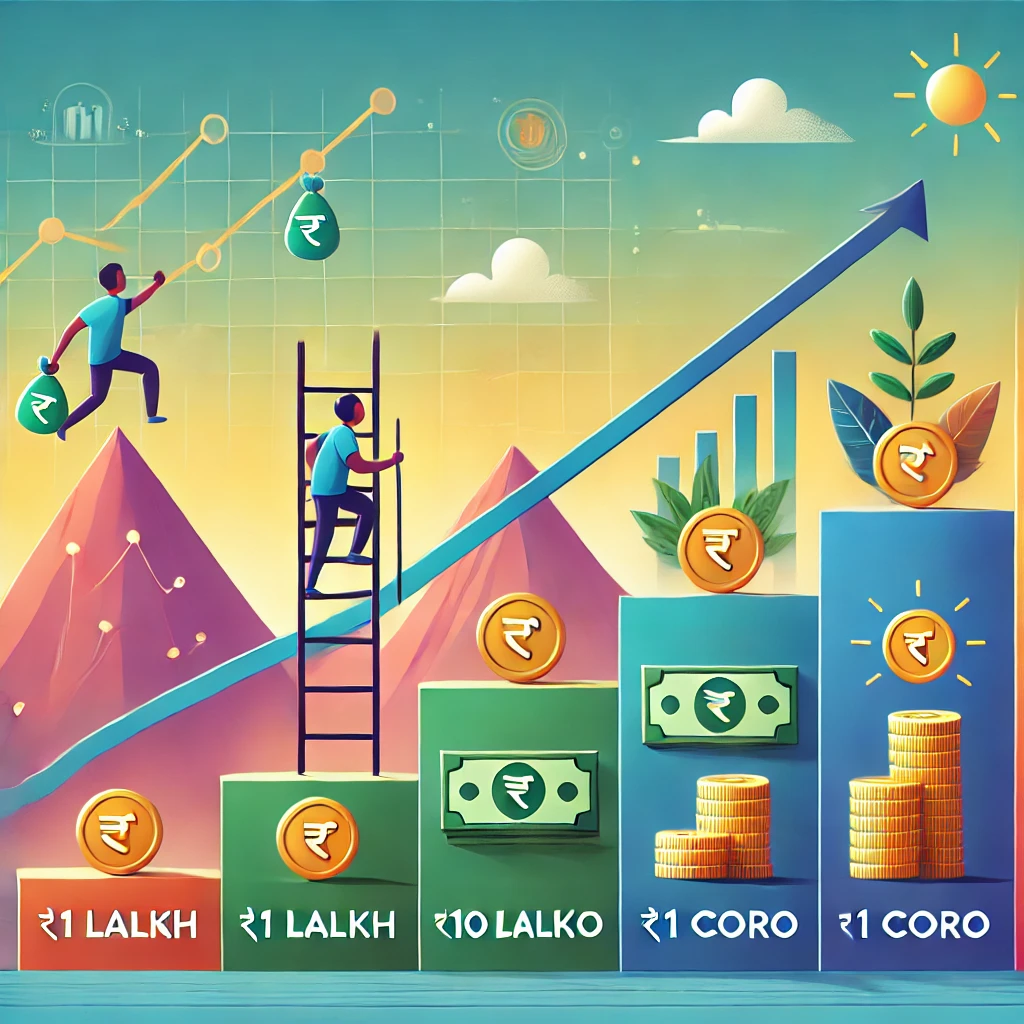Building wealth is a journey that begins with small steps and grows over time. For those aiming to retire early, the initial stages of accumulating wealth can feel slow and challenging. Many find that earning the first ₹1 lakh, ₹10 lakh, or even ₹1 crore is the hardest part. However, as your investments grow, the magic of compounding begins to take effect, accelerating your path to financial independence.
The Early Struggle: Building the First ₹1 Lakh and ₹10 Lakh
When starting with a low balance, every bit of savings may feel insignificant. Here’s why those initial milestones, like the first ₹1 lakh or ₹10 lakh, seem so hard to achieve:
- Low Starting Base: When you begin saving, small contributions may seem like a drop in the bucket. For instance, saving ₹10,000 each month to reach ₹1 lakh can feel slow because the amount is modest compared to larger goals.
- Limited Compounding Effect: Compounding, the principle of earning returns on reinvested earnings, has minimal impact on a small balance. With a ₹1 lakh investment growing at an 8% annual return, the first year only adds ₹8,000 in growth, which can feel slow.
- Building Discipline: Developing the habit of saving consistently and investing wisely can be challenging at first. It requires strong financial discipline, especially in a world full of spending temptations.
- Overcoming Lifestyle Inflation: As you progress in your career and income increases, it can be tempting to upgrade your lifestyle. Resisting these urges to maintain a high savings rate is essential but difficult for many.
Reaching the ₹1 Crore Mark: The Tipping Point
Once you’ve built up ₹10 lakh, you’re well on your way to hitting the next big milestone of ₹1 crore. Here’s how the journey changes as your investments grow:
- Compounding Takes Center Stage: When your balance is higher, compounding has a larger effect. For example, if you have ₹10 lakh growing at 8% annually, it will earn ₹80,000 in just one year, compared to ₹8,000 with ₹1 lakh. Over time, the effect snowballs.
- Faster Growth with Reinvestment: As your investment portfolio grows, so do your dividends, interest, and returns. Reinvesting these earnings fuels faster growth. What may have taken several years to accumulate in the beginning can now occur in much shorter time frames.
- Momentum and Motivation: Watching your wealth grow can provide a boost in motivation. Seeing the tangible results of your efforts and discipline makes it easier to stay focused and continue investing.
- Ability to Diversify: A larger portfolio allows you to diversify investments across stocks, bonds, real estate, and other assets. Diversification reduces risk, potentially improving returns and allowing you to capitalize on more opportunities.
Compounding: The Wealth Multiplier
Albert Einstein called compounding the “eighth wonder of the world,” and for a good reason. Compounding allows your wealth to grow exponentially, making it one of the most powerful tools in wealth-building. Here’s how it works:
- Earning Returns on Returns: Compounding is essentially the process of earning returns on your original investment plus any previously earned returns. For instance, if you invest ₹1 lakh at an 8% return, you’ll have ₹1.08 lakh after the first year. In the second year, you’ll earn interest on ₹1.08 lakh rather than just the initial ₹1 lakh, creating a snowball effect.
- Time is Your Ally: The longer you stay invested, the more compounding works in your favor. For those aiming to retire early, the key is to start investing as soon as possible and let time do the heavy lifting. For instance, at an 8% annual return, ₹1 lakh will grow to ₹2.16 lakh in 10 years, but to ₹4.66 lakh in 20 years, and nearly ₹10 lakh in 30 years.
- Avoiding Withdrawals: To maximize compounding, avoid withdrawing your investments prematurely. Every withdrawal disrupts the compounding process, making it take longer to reach your financial goals.
How to Harness Compounding for Early Retirement
To make the most of compounding, especially if you aim to retire early, here are a few strategies:
- Start Early: The sooner you start investing, the more you’ll benefit from compounding. Even small amounts saved and invested in your 20s can grow significantly by the time you’re ready to retire.
- Consistent Investments: Contribute to your investments regularly, even during market downturns. Consistency is key to maximizing compounding, as it smooths out returns and allows you to accumulate more assets.
- Reinvest Earnings: If your investments generate dividends, interest, or other returns, reinvest them rather than cashing out. This simple action can significantly accelerate growth.
- Patience and Discipline: Compounding requires time to show its full power. Stay patient, and don’t be discouraged by slower initial growth. Over time, compounding will create a snowball effect, making wealth-building much easier.
- Choose High-Growth Investments: While safety is important, investing in assets with good long-term growth potential, such as equities, can amplify compounding. A balance of growth and risk tolerance is crucial.
Final Thoughts: Embrace the Power of Compounding on Your Journey to FIRE
The journey to financial independence can be challenging at the start, but as your wealth grows, compounding will help speed up your progress. By focusing on consistent investments, disciplined savings, and letting time work in your favor, you’ll find that reaching ₹1 crore or even more becomes progressively easier. Compounding is a powerful ally that rewards patience and consistency—embrace it on your path to early retirement!
Join the conversation on Twitter and connect with others on the journey to financial independence. For more insights, check out our guide on Compounding Investments and Early Retirement Strategies.
